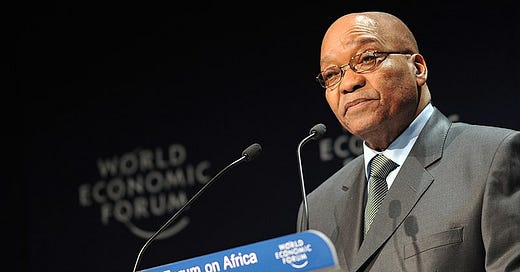
Zuma’s illiberal agenda disguised as an “anti-imperialist” project
What many democratic governments across the world have yet to realise is that democracy can only function sustainably if it affords all individuals due respect and deference.
Written by: Ayanda Sakhile Zulu
Former president and current leader of uMkhonto we Sizwe (MK) Party, Jacob Zuma, has openly expressed a desire to terminate the Constitution and instate a political system that would restore the autocratic powers of traditional leaders.
During many of his political rallies, he has lambasted what he perceives to be their sidelining under democracy, emphasising the importance of reestablishing them as the “true leaders of the people”. This is a dangerous policy position that would dissolve liberal democracy and erode the cherished rights and freedoms of individuals and disfavoured communities.
Private property rights do not exist under traditional autocracy. Land is owned communally and vested in the custodianship of the traditional leader. While traditionalists have attempted to portray this arrangement glowingly as a rejection of “Western individualism”, the reality is that it places individuals at the mercy of traditional leaders – and often simply the state –, who can and have abused their power to evict them off land without any justification and compensation.
In the absence of a constitution that guarantees individual rights and freedoms, serving as a crucial guardrail against the concentration of power, the risk of abuse and tyranny is high. Unfettered power can lead to the widespread violation of virtually all civil liberties that individuals are naturally entitled to. It can also enable traditional leaders to engage in corruption without being held accountable by democratic institutions.
What is even more dangerous is that Zuma is strategically framing this illiberal agenda as an attempt to revive indigenous governance structures while dismantling liberal democracy. He regards liberal democracy as a tool used by Western states to exert influence and control over African states.
In this context, his favourite example is that of the supposed role of money in influencing the political processes and outcomes of a liberal institution like the judiciary. In Zuma’s worldview, the judiciary is a captured and undemocratic institution that exists to serve Western interests by opposing “progressive policies” such as land expropriation, for instance. He doesn’t believe that it exists to safeguard the constitutional rights and freedoms of individuals.
The broader point about whether the processes and outcomes of liberal democratic institutions can be shaped by financial interests is not in question. What should be questioned, however, is Zuma’s past decision as state president to allow a wealthy Gupta family to effectively exercise state power by appointing and dismissing ministers in his cabinet. Was this not a case of him allowing individuals with money to influence our politics? Did this not amount to a subversion of the very democracy he claims to stand for? Does Zuma get a free pass because he regards himself as a traditional leader?
The critical lesson from state capture is that liberal democracy and its institutions are not the issue; rather, the problem lies with leaders who allow these institutions to be captured and corrupted by special interests. When these institutions cease to serve the people, those same leaders hypocritically rest the blame squarely on democracy and “Western imperialism”.
What many democratic governments across the world have yet to realise is that democracy can only function sustainably if it affords all individuals due respect and deference. While this is easier said than done, the responsibility rests on these governments to craft models of governance that deliver shared prosperity. Failing to do so will render them incapable of stemming the rising tide of populism in all its forms.
To be sure, the institution of traditional leadership does have a place in the country’s democracy as a custodian of culture and an active contributor to governance and service delivery. The existing constitutional framework recognises and governs it through several pieces of legislation. Section 81 of the Municipal Structures Act No.32 of 2000 permits traditional leaders to participate in municipal councils, where they can present challenges that affect their respective constituencies.
The National House of Traditional Leaders (NHTL), among its functions, provides traditional leaders with a platform to advance the aspirations of their constituencies and influence government legislative processes at the national level. Traditional leaders also control vital resources such as land, with the Ingonyama Trust being a prominent example.
The late founding president of the Inkatha Freedom Party (IFP), Prince Mangosuthu Buthelezi, correctly argued that traditional leaders should be given greater powers in the sphere of local government. While municipalities should not be ejected, traditional leaders must have a real voice when it comes to decisions that impact their constituencies.
Traditional leadership has the potential to evolve into a pivotal force in the exploration of alternative governance models that nonetheless do not impinge on the rights of individuals or vulnerable communities. In this respect, the initiatives of the Royal Bafokeng Monarchy are a good reference point. What simply needs to be resolved is the issue of communal land so people who live on land held in tribal trusts can become property owners.
Ultimately, while liberal democracy is not the be-all and end-all of governance, and the institution of traditional leadership should play a more prominent role, Zuma’s agenda to replace constitutionalism with the open-ended discretion of politicians must be rejected.
Ayanda Sakhile Zulu holds a BSocSci in Political Studies from the University of Pretoria and is an intern at the Free Market Foundation.







A stable nation-state requires consistency across governing structures. But it's for that very reason that South Africa isn't and shouldn't be a nation-state. Zuma should be agitating for federalism and local autonomy. But I doubt he wants to give up that much potential control.